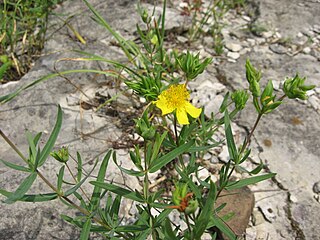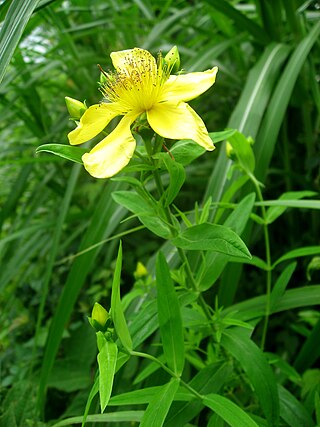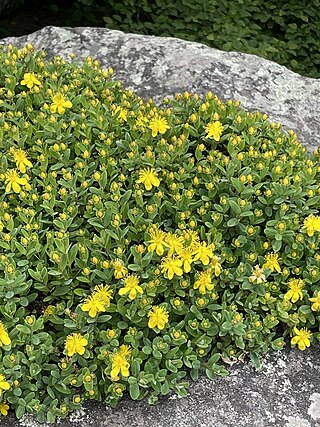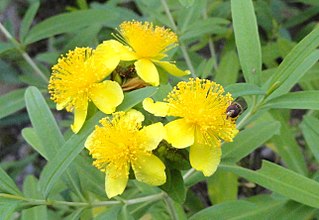
Hypericum perforatum, commonly known as St John's wort, is a flowering plant in the family Hypericaceae. It is a perennial plant that grows up to one meter tall, with many yellow flowers that have clearly visible black glands around their edges, long stamens, and three pistils. Probably a hybrid between the closely related H. attenuatum and H. maculatum that originated in Siberia, the species is now found worldwide. It is native to temperate regions across Eurasia and North Africa, and has been introduced to East Asia, Australia, New Zealand, and parts of North and South America. In many areas where it is not native, H. perforatum is considered a noxious weed. It densely covers open areas to the exclusion of native plants, and is poor grazing material. As such, methods for biocontrol have been introduced in an attempt to slow or reverse the spread of the species.

Hypericum is a genus of flowering plants in the family Hypericaceae. The genus has a nearly worldwide distribution, missing only from tropical lowlands, deserts and polar regions. Many Hypericum species are regarded as invasive species and noxious weeds. All members of the genus may be referred to as St. John's wort, and some are known as goatweed. The white or pink flowered marsh St. John's worts of North America and eastern Asia are generally accepted as belonging to the separate genus TriadenumRaf.

Hypericum maculatum, commonly known as imperforate St John's-wort, or spotted St. Johnswort, is a species of perennial herbaceous flowering plant in the family Hypericaceae. It is native to Europe and Western Asia where it grows in moist meadows.

Hypericum dolabriforme, the straggling St. Johnswort or glade St. John's-wort, is a species of flowering plant in the St. John's wort family Hypericaceae native to the United States.

Hypericum gramineum, commonly known as small St. John's wort or grassy St. Johnswort, is species of flowering plant in the St. Johns wort family Hypericaceae. It is found in parts of Southeast Asia, Oceania, and the Pacific.

Hypericum sphaerocarpum, the roundseed St. Johnswort or barrens St. John's wort, is a species of flowering plant in the St. John's wort family. It is native to the Eastern United States where it is primarily found in the Midwest and Mid-South as well as Ontario, Canada. Its preferred habitat is dry, calcareous glades and prairies.

Hypericum ascyron, the great St. Johnswort or giant St. John's wort is a flowering plant in the family Hypericaceae.

Hypericum buckleyi, known as Blue Ride St. John's wort and Buckley's St. Johnswort, is a rare species of flowering plant in the family Hypericaceae found only in the Appalachian Mountains of the southeastern United States. The species is listed in the state of Georgia (S1), South Carolina (SX), and North Carolina (S3).

Hypericum kalmianum, commonly called Kalm's St. Johns wort or Kalm's St. Johnswort, is a flowering plant in the St. John's wort family Hypericaceae. It is native to the Great Lakes region in the northern United States and southern Canada. Hypericum kalmianum was named after its discoverer, Swedish botanist Pehr Kalm (1715-1779).
Hypericum edisonianum, known as Arcadian St. John's wort, Edison's St. John's wort, and Edison ascyrum, is a species of flowering plant in the St. John's wort family, Hypericaceae. It is endemic to Florida.

Hypericum tenuifolium, known as Atlantic St. John's-wort and sandhill St. John's-wort, is a species of flowering plant in the St. John's wort family, Hypericaceae. It is native to the Southeastern United States.
Hypericum galioides, the bedstraw St. Johnswort, is a species of flowering plant in the St. John's wort family, Hypericaceae. It is endemic to the Southeastern United States.

Hypericum tetrapetalum, the fourpetal St. Johnswort, is a species of flowering plant in the St. John's wort family, Hypericaceae. It is found in the Southeastern United States and Cuba. It was first described by Jean-Baptiste Lamarck in 1797.

Hypericum lancasteri, known as Lancaster's St. John's wort or as zhan e jin si tao in Chinese, is a species of flowering plant in the St. John's wort family Hypericaceae. The species has been awarded the Royal Horticultural Society's Award of Garden Merit.
Hypericum myrtifolium, the myrtleleaf St. Johnswort, is a species of flowering plant in the St. John's wort family, Hypericaceae. It is endemic to the Southeastern United States. It was first described by Jean-Baptiste Lamarck in 1797.

Hypericum frondosum, the cedarglade St. Johnswort or golden St. John's wort, is a species of flowering plant in the St. John's wort family, Hypericaceae. It is native to the central and southeastern United States in dry, rocky habitats.
Hypericum erythreae, the Georgia St. John's-wort, sparse-leaved St. John's-wort, or grit St. Johnswort, is a species of flowering plant in the St. John's wort family, Hypericaceae. It is native to the southeastern United States in seepage bogs and roadside ditches. Its name grit St. Johnswort comes from its limited distribution, within the Altamaha Grit region of the Georgia coastal plain.

Hypericum fasciculatum, known as peelbark St. Johnswort or sandweed, is a species of flowering plant in the St. Johnswort family, Hypericaceae, native to the southeastern United States. It is found from eastern North Carolina, south to southern Florida, west to eastern Louisiana. Kew's Plants of the World Online database also notes that it occurs in Cuba, though Cuba is not listed in several other sources. It was first described in 1797 by Jean-Baptiste Lamarck.

Hypericum tubulosum, the lesser marsh St. Johnswort or southern marsh St. John's-wort, is a species of flowering plant in the family Hypericaceae. Formerly classified as synonym Triadenum tubulosum, the species is found across the Southern United States and Midwest. It grows in wetlands such as bogs and floodplains.

Hypericum walteri, the greater marsh St. Johnswort or Walter's marsh St. John's Wort, is a flowering plant endemic to the eastern United States, from Texas to Delaware north to Illinois. It grows along waterbodies such as lakes and streams, in marshes, and in swamp forests.














